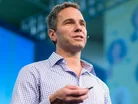Meet Chris Barton, founder of music recognition app Shazam

When Shazam was released in 2002, it transformed how we source and collect music. Today, creator Chris Barton discusses the life lessons he learned while founding Shazam and how the application pushed the boundaries of technology. Hear from the trending innovation speaker himself, in this interview.
What can businesses learn from your entrepreneurial experience?
I think that businesses can learn that one key, very important ingredient to innovation... successful innovation, is to start from a breakthrough idea. But then, very importantly, once you have that breakthrough idea and you're on the path towards realising your vision, your outcome, your innovation, you're going to meet all kinds of barriers and unknowns along the way.
I think that one unique thing that entrepreneurs do is they focus their conviction on their ultimate vision, they really focus on breaking through those barriers and finding solutions to them along the way. I believe that many businesses might sort of divert or concede in some of these barriers and then you end up with a suboptimal innovation outcome.
Who or what inspired you to create Shazam?
I was inspired to create Shazam because I saw three opportunities at the same time. A problem I faced in my daily life was hearing songs out and about and wondering what they were. I wanted to find out what they were and add them to my personal little playlist and turn it into sort of a mix tape, or what would now be called a playlist.
However, at the time that I came up with a concept for Shazam, which was in late 1999, phones were very basic. They were very simple and all you could do with mobile phones was make phone calls, send text messages and really nothing else. I thought, ‘gosh, there's got to be something you can do with these mobile phones. You're carrying this device everywhere you go; wouldn't it be great if you could do other things with it?’
So, I thought, ‘oh wow, what if you could identify songs? What if that was the unique offering?’ What was really neat was in the original vision of Shazam, you would only need two capabilities of a mobile phone to identify songs, and those were microphones to record the sound in a phone call and text messages to send the information back to the user.
The third opportunity I saw for Shazam was that I wanted to use a disruptive technology. I love the idea of building a business based on inventing some brand new, unexpected, disruptive technology. It turned out that music recognition would require such an invention! Those three things coming together created what I thought was a great opportunity.
How did Shazam push the boundaries of technology?
Shazam was really a very early execution of artificial intelligence, and the definition of artificial intelligence is basically, finding a way to get computers to do something that's normally done by humans. This was 20 years ago, so we were ahead of our time in terms of being an AI company. We didn't use what's now known as machine learning, which is a modern form of AI, but we did have to invent our own pattern recognition technologies.
This exclusive interview with Chris Barton was conducted by Mark Matthews.



